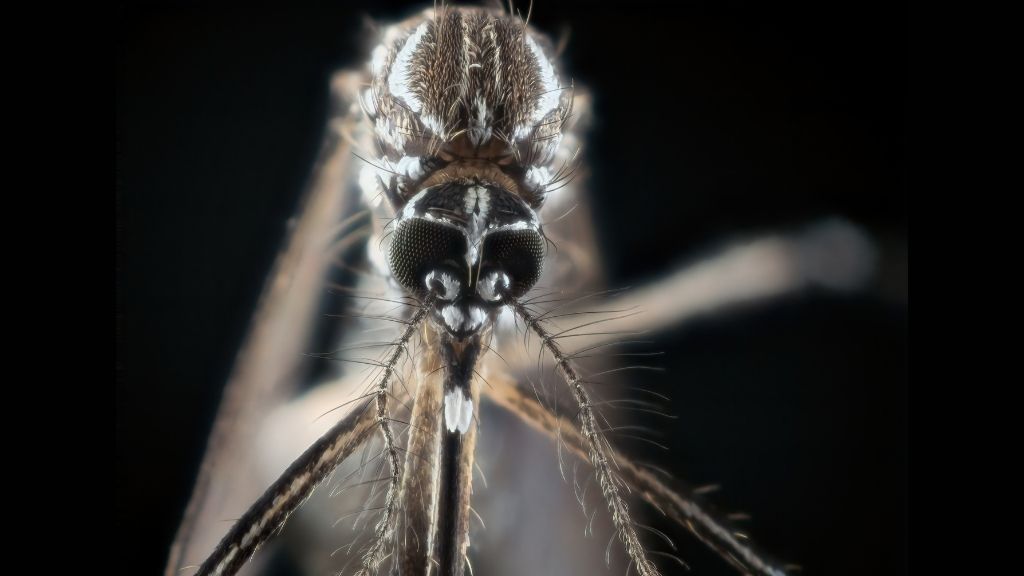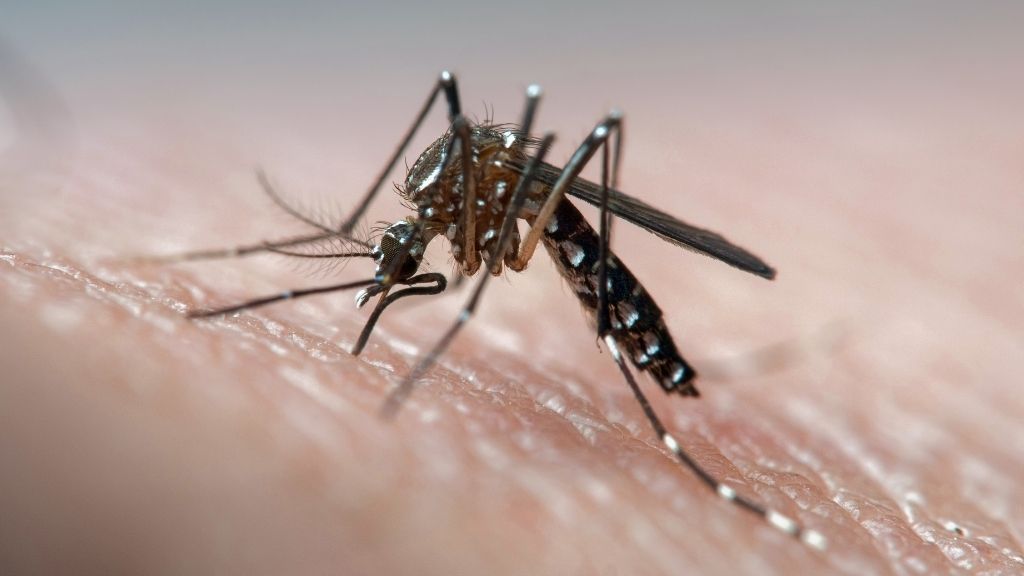How do mosquitoes sniff out humans to bite?
Turns out mosquitoes adore a certain orangey odor.

It's the dead of night and you're tucked away in bed, bundled up to your chin in a pitch dark room — and suddenly you hear the telltale buzzing of a mosquito zoom past your ear.
Some mosquito species specialize in biting humans, and these tiny blood-suckers excel at tracking us down. The question is, how do mosquitoes hone in on their victims with such precision?
The answer: Mosquitoes can use their sense of smell to pinpoint their next human victim, even if that person's odor is intermingled with that of nearby animals and the surrounding environment. Humans exude a unique bouquet of odors that's distinct from the smells exuded by other creatures, and for mosquitoes, this scent acts like a huge homing beacon, drawing them toward their next blood meal.
"There are over 3,000 different species of mosquitoes in total, but only a few mosquitoes specialize in biting humans," said Zhilei Zhao, a postdoctoral researcher of neurobiology and behavior at Cornell University. Zhao and his colleagues studied one such mosquito species, called Aedes aegypti, which shows an overwhelming preference for biting humans over feeding on other animals.
"Aedes aegypti loves humans. They love our odor," said Matthew DeGennaro, a neurogeneticist and associate professor at Florida International University, who was not involved in the study. Unfortunately, the pests carry a wide array of pathogens and can spread diseases like Zika, dengue, chikungunya and yellow fever to the humans they nip.
Related: Why do mosquitoes buzz in our ears?
"We have known for a long time that A. aegypti mosquitoes are particularly attracted to … humans compared to other animals. This is part of the reason that they’re such a public health menace," said Laura B. Duvall, an assistant professor in the Department of Biological Sciences at Columbia University, who was not involved in the study.
Get the world’s most fascinating discoveries delivered straight to your inbox.
Past studies have suggested that A. aegypti mosquitoes can smell the carbon dioxide we exhale and use this chemical cue to find human flesh to bite, according to a 2022 report in the journal Nature Communications. DeGennaro and his colleagues recently discovered that the pests can also smell specific components of human sweat, including lactic acid, he told Live Science in an email. And another study found that the mosquitoes flock towards Brevibacterium linens, a bacterium found on human feet that also gives Limburger cheese its distinctive smell, Live Science previously reported.
But although scientists know that all these chemical cues help A. aegypti mosquitoes target humans, "most of these [cues] are found in both humans and animals," Duvall told Live Science in an email. Somehow, the mosquitoes still manage to pluck humans out of the line up of potential prey, despite animals emitting similar scent compounds. "We didn't know how they were able to tell the difference," Duvall said.
Zhao's 2022 study, published May 4 in the journal Nature, uncovered a possible solution to this mystery by zooming in on the mosquitoes' miniscule brains.
To do this, the researchers first used a gene-editing technique called CRISPR-Cas9 to splice genes for a fluorescent protein into mosquitoes' DNA; they specifically used female A. aegypti mosquitoes, since the males of the species drink nectar instead of biting humans. Once inserted, the gene directed the mosquitoes' cells to stick the fluorescent protein into specific nerve cells, or neurons, in the bugs; when these neurons switched on, the protein glowed in response.
"So when neurons are active, the fluorescence increases," said Zhao, who was a doctoral student at Princeton University at the time the research was conducted. In this way, the team imbued smell-processing centers in the mosquitoes' brains with these light-up proteins, and they also stuck the proteins into the blood suckers' scent-detecting organs, such as their antennae and maxillary palps, which are tiny sensory organs that jut out from the bugs' mouthparts.
The team then exposed the mosquitoes to a sampling of scents that they'd collected from different animals, including rats, guinea pigs, quails, sheep, dogs, and of course, humans; each of these sampled scents contained a blend of different compounds let off by the animals. To see which areas of the mosquito brain lit up in response to the different fragrances, the team sliced into the bugs' puny heads.
Related: Should we kill every mosquito on Earth?
"The brain is super small," only about 0.01 inches (0.5 millimeters) across, Zhao said. Working under microscopes, the team would peel away the outer cuticle covering the mosquitoes' heads, carefully exposing the bugs' fluoresce-riddled brains. The mosquitoes remained alive throughout the delicate procedure. "Your hands need to be steady, otherwise you kind of just destroy the brain," he said.
One bulbous bundle of nerves, known as a glomerulus, showed a strong reaction to human scents but a weak reaction to animal smells, the team found. They called these nerves the human-sensitive (H) glomerulus. A different glomerulus (labeled A) showed the opposite pattern, reacting strongly to animal but not people scents, and a third glomerulus (labeled B) reacted strongly to all the test odors. To better understand these patterns of activation, the team broke down the animal fragrances into their component compounds, to analyze them individually and in different blends.
They pinpointed two compounds — known as decanal and undecanal — that consistently appeared in large quantities in their human scent samples but in low quantities in the animal samples. These compounds smell sweet and citrusy, similar to an orange peel, and are found in human sebum, an oil produced by glands in the skin.
The newly-identified H glomerulus seemed specifically tuned to these compounds, reacting especially strongly to a synthetic blend of the two. Meanwhile, the B glomerulus only reacted modestly to this scent and the A glomerulus didn't react at all. The A. aegypti mosquitoes showed a profound attraction towards the blend, even flying toward it in a test conducted in a wind tunnel, the researchers found. This hinted that decanal, undecanal and the H glomerulus activity provoked by the compounds are key to how the mosquitoes track down human hosts.
"It is amazing to me that there is only one glomerulus whose activation pattern is human specific. I would have thought there are more," DeGennaro said. However, the H glomerulus likely isn't working in complete isolation — mosquitoes have other chemical-detecting sensory systems, in addition to the neurons the team analyzed, that also help them home in on hosts, Duvall said. The H glomerulus just seems to be a key driver of A. aegypti mosquitoes' human-hunting behavior.
The authors didn't test whether blocking activity in the H glomerulus would shift Aedes aegypti mosquito preference away from humans and toward animals, but this could be an interesting avenue for research. In theory, scientists could develop chemical formulas that tune down the activity of the H glomerulus and thus make mosquito repellants more effective, DeGennaro said. Zhao told Live Science that his colleague is working on developing such compounds now.
Another potential application for the research would be to brew mosquito attractants, or chemicals that could be used as bait to "lure mosquitoes away from humans and into a trap," Duvall noted. Zhao and his colleagues have patented their decanal-undecanal blend and hope to put it toward such a purpose.
Zhao said he suspects that other mosquito species likely show similar patterns of brain activation in response to human smells, provided that they use humans as their primary host. "It would be interesting to look at other species that have developed human preferences, like Anopheles mosquitoes that can transmit malaria, or species with other host preferences like bird-preferring Culex mosquitoes," which generally bite animals more often than humans, Duvall said.
Originally published on Live Science.

Nicoletta Lanese is the health channel editor at Live Science and was previously a news editor and staff writer at the site. She holds a graduate certificate in science communication from UC Santa Cruz and degrees in neuroscience and dance from the University of Florida. Her work has appeared in The Scientist, Science News, the Mercury News, Mongabay and Stanford Medicine Magazine, among other outlets. Based in NYC, she also remains heavily involved in dance and performs in local choreographers' work.
 Live Science Plus
Live Science Plus







